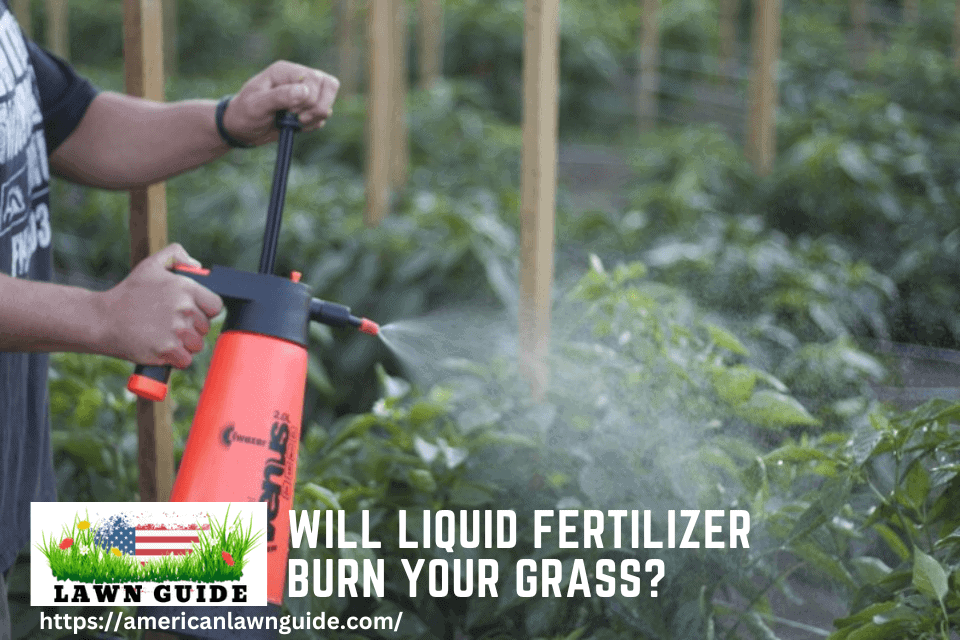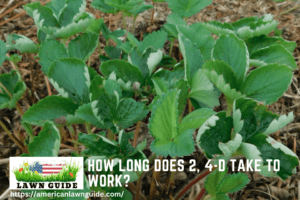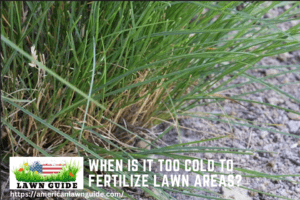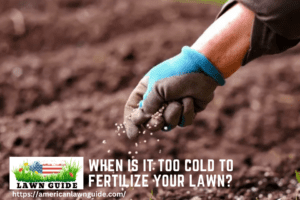No, liquid fertilizer will not burn your grass. However, if you apply too much fertilizer or if the weather is hot and dry, the fertilizer can damage the grass.
There’s a common misconception that using liquid fertilizer will burn your grass. The truth is, as long as you’re following the instructions on the label and not applying too much, you shouldn’t have any problems. Of course, like with anything else, there is always the potential for overuse.
If you pour on too much liquid fertilizer, it can indeed burn your grass. That’s why it’s important to read and follow the directions carefully. If you’re concerned about using liquid fertilizer, consider mixing it with water in a sprayer before applying.
This will help to prevent any potential burning or damage to your lawn.
Will Fertilizer BURN Your Lawn?
Can Liquid Fertilizer Burn Lawn?
Yes, liquid fertilizer can burn your lawn if you’re not careful. Fertilizers contain a high percentage of nitrogen and other chemicals, so it’s important to follow the instructions precisely if you want to avoid burning your grass. If you apply liquid fertilizer to your lawn and it doesn’t rain within a day or two, the nitrogen in the fertilizer may burn the grass. That’s because the nitrogen will have time to take effect before being washed away by the rain.
If you do end up burning your grass, don’t worry — it’s not as big of a problem as you might think. The grass should return to normal within a week or two. You can use this link to learn more about how to treat burned grass.
How Often Should You Use Liquid Fertilizer?
The short answer is, it depends. Getting a fertilizer schedule that works best for your lawn will depend on many different factors, including the weather, soil conditions and how much water is available. However, there are some general guidelines you can follow:
Fertilizer should be applied once or twice per month during spring and summer. During this time, you’ll want to use a nitrogen-heavy fertilizer.
During fall and winter, you’ll want to use a phosphorus-heavy fertilizer. You should also cut back on how often you’re applying fertilizer, as the grass won’t grow nearly as fast during these months.
What Type of Fertilizer Burns Grass?
Fertilizers that are high in nitrogen can burn grass if not applied correctly. When too much nitrogen is applied, it can cause the grass to grow too quickly and become stressed. This can result in yellowing, wilting, and eventual burning of the grass. To avoid burning your grass, make sure to read the label on your fertilizer and follow the instructions for application carefully.
Additionally, make sure to water your lawn after applying fertilizer to help wash away any excess nitrogen. Is Liquid Fertilizer Better than Granular?
Will Liquid Fertilizer Burn Grass If Not Watered?
Liquid fertilizer can burn grass if not watered in properly. If you apply too much, or don’t water it in well, the fertilizer can sit on top of the grass and bake in the sun, causing the blades to turn brown.
Will Grass Come Back After Fertilizer Burn?
If your lawn has been damaged by too much fertilizer, don’t despair. The grass will usually recover given time and some basic care. Here’s what you need to do to help your lawn bounce back:
1. Reduce or stop fertilizing. If you’re still applying fertilizer to your lawn, cut back on the amount you’re using or stop altogether. Applying more fertilizer will only worsen the damage.
2. Water deeply and less often. Watering deeply encourages roots to grow deep into the soil where they can access more moisture and nutrients. This is especially important in hot weather when the top layer of soil dries out quickly. Watering less often allows the root system to develop further and makes the grass more drought-tolerant once it recovers.
3. Mow high. Set your mower blade to its highest setting so you’re not removing too much grass with each cut. This will also help reduce stress on the grass plants as they try to recover from fertilizer burn damage.
How Do I Keep My Lawn from Burning After Fertilizing?
It’s important to keep your lawn from burning after fertilizing because if you don’t, the chemicals in the fertilizer can damage the blades of grass and cause them to turn brown. There are a few things you can do to prevent this from happening. First, make sure you use the correct amount of fertilizer for your lawn.
Too much fertilizer can lead to burning, so it’s important to follow the directions on the package. Second, water your lawn before and after applying fertilizer. This will help dilute the chemicals and prevent them from concentration in one area and causing burning.
Finally, avoid applying fertilizer during hot, dry weather. The heat can exacerbate the effects of the chemicals and cause more burning. If you must fertilize during these conditions, be sure to water heavily both before and after applying the fertilizer.

What is One Disadvantage of Liquid Fertilizer?
While liquid fertilizer has a number of advantages, there is one significant disadvantage – it can be difficult to apply evenly. When you are trying to spread liquid fertilizer over a large area, it can be tough to ensure that each square foot gets the same amount of product. This can lead to areas of your lawn or garden getting too much or too little fertilizer, which can impact plant growth.
How to Treat Fertilizer Burn on Grass ?
If your lawn is looking a little worse for wear after you’ve applied fertilizer, it’s likely that you’ve suffered from fertilizer burn. Fertilizer burn is a common problem that gardeners and landscapers face, but luckily, it’s relatively easy to treat. Here are a few tips on how to treat fertilizer burn on grass:
1. The first step is to identify the affected areas. You’ll usually be able to see where the burn has occurred because the grass will have turned brown or yellow.
2. Once you’ve identified the burned areas, water them thoroughly. This will help to dilute the concentration of fertilizer and reduce the damage caused by the burn.
3. If possible, apply a light layer of mulch over the affected areas. This will help to protect the grass and promote new growth.
4. Be patient! With some tender loving care, your lawn will soon recover from fertilizer burn and be looking green and healthy in no time!
How Do You Fix a Burnt Fertilizer on Grass?
If you do burn your grass after applying fertilizer, there’s no need to worry. Grass that is burned from fertilizer should return to normal within a week or two. However, it’s important to take the right steps in order to ensure you don’t make things worse.
The first thing you should do is cut back on watering your lawn. This will allow the sun to dry out the grass and help it heal more quickly. You should also avoid fertilizing your lawn at all until it has fully recovered.
Another factor to keep in mind is that watering may not be enough if you’ve applied too much fertilizer to your lawn. If that’s the case, you can use a hose to wash away as much of the fertilizer as possible. Additionally, you might want to consider contacting a professional landscaper to help with the issue.
Will Grass Grow Back After Fertilizer Burn?
If you’ve ever had a lawn that’s been “fertilizer burned,” you know it’s not a pleasant experience. Fertilizer burn is caused by over-fertilizing your lawn, and it can cause the grass to turn brown and die. But the good news is that, in most cases, the grass will grow back after fertilizer burn.
The key to preventing fertilizer burn is to apply the fertilizer properly. Make sure you follow the directions on the fertilizer package, and don’t apply more than what is recommended. It’s also important to water your lawn after applying fertilizer, as this will help prevent the fertilizer from burning the grass.
If you do end up with a case of fertilizer burn, don’t despair. The grass will usually start growing back within a few weeks. Just be patient and keep watering your lawn, and eventually things should return to normal.
Fertilizer Burn Grass
Fertilizer burn is a common problem when using chemical fertilizers on lawns and gardens. The symptoms of fertilizer burn are brown or yellow patches of grass that appear stunted or dead. Fertilizer burn occurs when the fertilizer nutrients are too concentrated for the roots of the plants to absorb.
This can happen if you use too much fertilizer, apply it too often, or don’t water enough after applying fertilizer. Fertilizer burn can also occur if you use a fertilizer with a high salt content. To avoid fertilizer burn, start by using only the amount of fertilizer recommended on the package label.
Apply it evenly over the entire area you are treating, and water thoroughly after application. Be sure to follow all instructions on the label carefully. If you have any questions about how to properly use fertilizers, ask your local nursery or garden center staff for advice.
Conclusion
No, liquid fertilizer will not burn your grass. In fact, it can be a great way to provide nutrients to your lawn and help it stay healthy and green.




